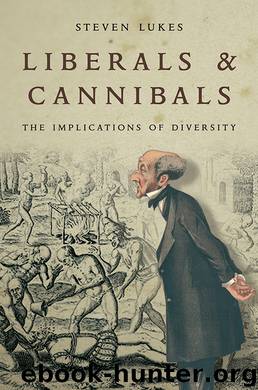Liberals and Cannibals by Steven Lukes

Author:Steven Lukes
Language: eng
Format: epub
Publisher: Verso Books
The criticism in question may take the form of attempts at what he calls ‘empirical enlightenment’ – or one can ‘reject a culture because one finds it morally or aesthetically repellent.’84
Furthermore, he did go some way to limiting the scope and range of such value pluralism. Thus, in the first place, he ventured the thought that ‘more people in more countries at more times accept more common values than is often believed’.85 Second, he suggested in his Agnelli lecture and further developed in the aforementioned interview86 the thought that many conflicts between incompatible values, even where incommensurable, are capable of resolution through ‘trade-offs’, especially in the field of public policy, where the principle of resolution appealed to is utilitarian in a very broad sense87 (minimizing suffering or not frustrating too many people’s ultimate ends). The hard cases are dilemmas where both choices are morally binding, where there is no way of not doing wrong.
All this can, I suggest, be read as a counter-argument or sub-text that qualifies and limits the master-argument against monism and for pluralism delineated above. Its upshot is to begin to refine the value pluralism to which he remained committed in a way that is consonant with the liberalism he always defended and, more generally, with the values of the left. It is a pluralism intended to be compatible with the absolute, overriding and universal value of liberty, the existence of a common human nature, rational criticism and the tractability of many but not all value conflicts in public and private life. He certainly did not return an unambiguously affirmative answer to the questions with which he wrestled: do we truly believe that value judgments are not judgments at all, but arbitrary acts of self-commitment, that the sciences of man are irrelevant to political purposes, that anthroplogy, psychology, sociology can instruct us only about means, about techniques, that since values collide, there are no reasons for choosing one rather than another, so that if men, or groups of men, are possessed by different outlooks, that is the end of the matter, so that war between them is a more honourable proceeding (for those who believe in honour) than attempts to find an intermediate solution that fully satisfied the beliefs of neither side?
Like Herzen, he believed in ‘reason, scientific methods, individual action, empirically discovered truths’. Unlike Hamann, he believed in ‘that appeal to rational discussion in terms of principles intelligible to most men which alone can lead to an increase in knowledge, the creation of conditions for free cooperative action based on conscious acceptance of common ideals, and the promotion of the only type of progress that has ever deserved this name’. The ultimate challenge of Berlin’s thought is, in short, to develop and defend a pluralism of values that preserves the central message of the Enlightenment while firmly rejecting the nihilism and relativism of its past and present detractors.
Download
This site does not store any files on its server. We only index and link to content provided by other sites. Please contact the content providers to delete copyright contents if any and email us, we'll remove relevant links or contents immediately.
| Anarchism | Communism & Socialism |
| Conservatism & Liberalism | Democracy |
| Fascism | Libertarianism |
| Nationalism | Radicalism |
| Utopian |
The Secret History by Donna Tartt(18951)
The Social Justice Warrior Handbook by Lisa De Pasquale(12170)
Thirteen Reasons Why by Jay Asher(8849)
This Is How You Lose Her by Junot Diaz(6839)
Weapons of Math Destruction by Cathy O'Neil(6221)
Zero to One by Peter Thiel(5736)
Beartown by Fredrik Backman(5683)
The Myth of the Strong Leader by Archie Brown(5463)
The Fire Next Time by James Baldwin(5390)
How Democracies Die by Steven Levitsky & Daniel Ziblatt(5175)
Promise Me, Dad by Joe Biden(5117)
Stone's Rules by Roger Stone(5055)
A Higher Loyalty: Truth, Lies, and Leadership by James Comey(4909)
100 Deadly Skills by Clint Emerson(4883)
Rise and Kill First by Ronen Bergman(4741)
Secrecy World by Jake Bernstein(4703)
The David Icke Guide to the Global Conspiracy (and how to end it) by David Icke(4659)
The Farm by Tom Rob Smith(4468)
The Doomsday Machine by Daniel Ellsberg(4452)
